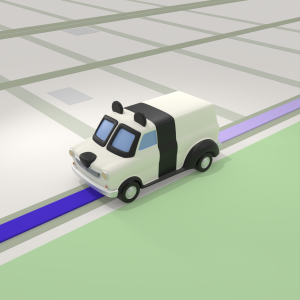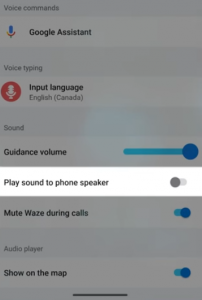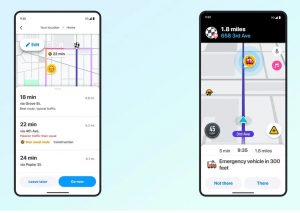Who wouldn’t want to tell Po where to go?
Or at least how to get there.
Among the new features being added to the already popular driving app Waze is getting your navigation directions narrated by a fun-loving panda bear: the martial artist known as Po, star of the Kung Fu Panda movie franchise.
As part of promotional campaigning for the latest film, Kung Fu Panda 4, another sound selection is available to Waze app users, who can now select Po’s voice to narrate their drive.
Waze provides driving directions, road alerts, travel time estimates and more navigation aids, using GPS, live traffic data and multiple other sources; it is also a powerful connective tool uniting time and place. People, too: its community of mobile users is said to be some 150 million strong worldwide.
And there’s a lot of Po fans, as well: earlier this week, just days after release, Panda 4 passed the $100 million mark in worldwide ticket sales.

Lots of Panda Vans – that’s movie star Po’s custom vehicle – are moving about as ‘avatars’ on people’s Waze driving app screens.
So there’s bound to be lots of Panda Vans – that’s Po’s custom vehicle – moving about as ‘avatars’ on people’s on-screen Waze maps – Wazers, as members of the user community are known, can select custom icons and graphic images to represent themselves, their friends, their destinations and other features on route maps displayed in the app. Choosing the ‘Spiritual Mood’ is said to let other Wazers know you are on a journey to enlightenment.
That puts a friendly, familiar face on just one of several powerful data sharing features in the app: it connects to a web of real-time data sources with information about traffic flow, road conditions, community events and much more. Information is provided by app users, with added data and detail from local governments and regional councils, from first responders and emergency management agencies, and from other partners in the development company’s cloud-based data collection and analysis platform, called the Waze for Cities Data Program.
Sometimes the partners are, well, cartoon characters!
With the Emmy-award-winning voice artist Jack Black returning to his role as the world’s most unlikely kung fu master, Po’s popularity makes him one of several celebrities whose voice has been integrated as one of the many customizable features of Waze.

App users can choose celebrity voices from licensed movies, musical acts and more, which can be pre-selected, volume-adjusted and even mixed with other audio sources for delivery on a vehicle’s speakers and sound system.
App users can choose celebrity voices from licensed movies, musical acts and more; they can be volume-adjusted and even mixed with other audio sources for delivery on a vehicle’s speakers and sound system.
From Po to Arnold Schwarzenegger to Christina Aguilera (back in 2022, her words in English y idioma español, as well as sound effects from her albums, were available to spice up your drive), Waze has often included such entertainment-oriented or ‘gamification’ features in its app, leading one user to call the optional voices “nostalgic longings for a soothing childhood” – and boy, drivers often needed soothing!
But other new app features are specifically traffic-oriented: Waze says it will have more up-to-date info about speed limits available for all users, and the app can start warning drivers about a wider array of potential road hazards on a particular route, like speed bumps, sharp turns and toll booths. New parking information for over 30,000 parking garages across the U.S. and Canada, including major cities like New York, Chicago and Montreal, are also touted.
App users appreciate such features, but some have complained about the number of choices and screen prompts that must be navigated to take full advantage. Especially if driving!
Whether for a one-time drive or chosen from a stored list of regular routes you take, Waze provides live traffic updates and warnings about delays along the way; there’s also the option to pick a slightly faster route suggested by the app, based on all the data it is collecting from city traffic sources and individual app users.
Using the real-time updates from other drivers, it’s like crowd-sourced, community-based navigation. App users can update the maps and add places of interest along the route, comment on gas prices they see nearby, and share pretty much any detail of their trip with any other user and any contact on their phone.
Such data interconnections and gathered information, for example, enable Wazers to warn other app-using drivers if there are first responders that have stopped on the road ahead; it’s a handy feature when travel time is precious and interruptions unwanted, certainly. Knowing about planned snow plowing on certain routes can really help ease a commute.
But the app’s data-savvy ability to know where emergency officials, including police officers, might be located was a concern to law enforcement agencies, worried that the right data in the wrong hands could lead to problems.
With some tweaking, and continued flow of information from Waze City partners, the company says an update is available to drivers in the U.S., Canada, Mexico and France on Android and iOS, with more countries coming soon.

Waze says it will have more up-to-date info about speed limits available for all users, and the app can start warning drivers about a wider array of potential road hazards or delays on a particular route.
Other incoming data from municipal sources are integrated, allowing the app to have official information about road closures, detours, civic events and other scheduled activities that impact traffic flow.
The app is free to download and use; the company does use on-screen ads and banner pop-ups from its many advertising and sponsor partners, and the paid content is often tied to your precise location: on your trip, at a red light say, a banner may appear on your device screen touting some caffeinated fuel for you or some cheap gas for your car to be found nearby.
Of course, the app collects many types of information from its community of interacting users and partners, integrating personal, device, location and several other data types that may be shared with third-party providers, as the company describes in its privacy policy.
Waze Mobile started out by providing an open-source map service in the country where it was founded; the software was developed in Israel and the company founded by entrepreneurs Ehud Shabtai, Amir Shinar, and Uri Levine, who are veterans of the Israeli intelligence service and a specialized unit known for its technical expertise in monitoring and collecting information from multiple media, mobile and IT sources, Unit 8200.
When Waze was acquired by Google for more than a billion dollars, reports called it one of the most lucrative exits in Israeli tech history, a long and productive history that includes Waze and dozens of technology companies operating in the corporate, military-industrial and consumer sectors that have emerged from Israel, such as CheckPoint, Elbit Systems, WiSpear, Verint, Resonai, NSO Group, and Palo Alto Networks among them.
Only one has Po, tho.
# # #

With Po as your navigator, you can keep zen smooth even when the traffic gets rough. The new voice feature in the Waze driving app offers up mindfulness prompts from the feature film character like: “Today we shall love our fellow road users as family. Even if they cut us off. Or don’t let us merge. Or never signal! Aaaaaaaargh that drives me so crazy but we shall love them anyway. Or at least try to.”
-30-



